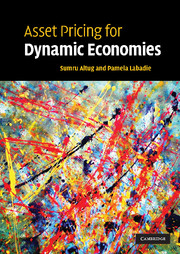Book contents
- Frontmatter
- Contents
- List of figures
- List of tables
- Preface
- I BASIC CONCEPTS
- II RECURSIVE MODELS
- 6 Dynamic programming
- 7 Intertemporal risk sharing
- 8 Consumption and asset pricing
- 9 Non-separable preferences
- 10 Economies with production
- 11 Investment
- 12 Business cycles
- III MONETARY AND INTERNATIONAL MODELS
- IV MODELS WITH MARKET INCOMPLETENESS
- V SUPPLEMENTARY MATERIAL
- Bibliography
- Index
8 - Consumption and asset pricing
Published online by Cambridge University Press: 01 June 2010
- Frontmatter
- Contents
- List of figures
- List of tables
- Preface
- I BASIC CONCEPTS
- II RECURSIVE MODELS
- 6 Dynamic programming
- 7 Intertemporal risk sharing
- 8 Consumption and asset pricing
- 9 Non-separable preferences
- 10 Economies with production
- 11 Investment
- 12 Business cycles
- III MONETARY AND INTERNATIONAL MODELS
- IV MODELS WITH MARKET INCOMPLETENESS
- V SUPPLEMENTARY MATERIAL
- Bibliography
- Index
Summary
In this part we turn our attention to the analysis of dynamic economies using a recursive equilibrium approach. We begin our analysis with the consumption-based capital asset-pricing model of Lucas [319], Breeden [74], and others. We assume that there is a representative consumer and output evolves according to an exogenous Markov process. There is a rich array of assets traded in economies with well-developed capital markets. We show how this framework can be used for pricing such assets as equities which yield a random dividend stream, bonds of different maturities, and options on various underlying assets.
The remainder of this chapter is organized as follows. First, we demonstrate the existence of a recursive competitive equilibrium for a pure endowment economy based on Lucas [319]. We show the existence of a value function and the equilibrium asset-pricing function, and examine their properties. Second, we use this framework to derive the prices for a variety of assets, including pure-discount bonds of various maturities and derivative instruments such as options and forward contracts. Third, we describe asset pricing in a non-stationary environment when the aggregate endowment is growing. We also introduce a diagnostic tool known as volatility bounds for intertemporal MRSs or stochastic discount factors that allow a convenient way for examining the implications of alternative asset-pricing models.
- Type
- Chapter
- Information
- Asset Pricing for Dynamic Economies , pp. 162 - 201Publisher: Cambridge University PressPrint publication year: 2008



